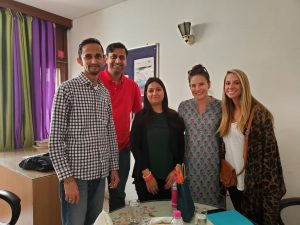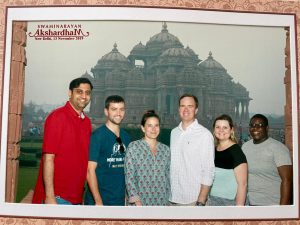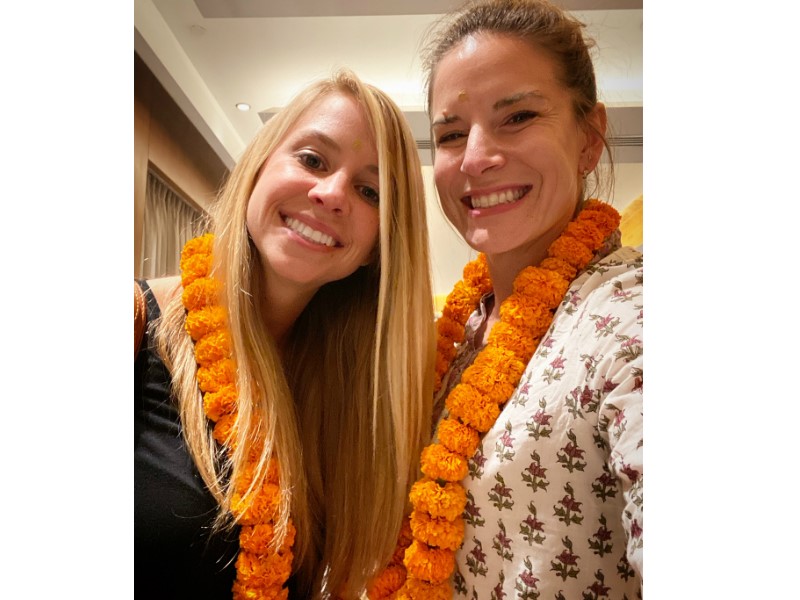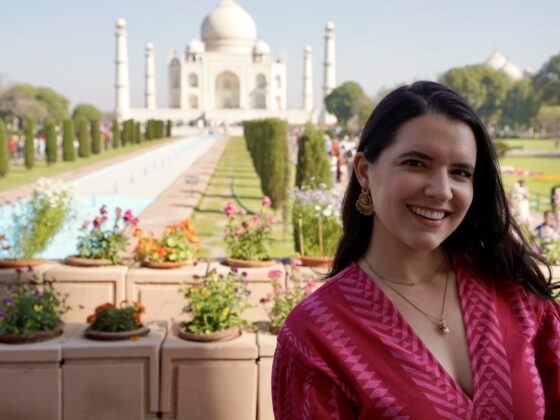Executive MBA student Jessica Block (Class of 2020, right in above photo) took part in the Executive MBA global residency in India in November 2019. Asked to reflect on an “essential question” during the residency, Jessica shared her insights with us in her own words:
My impression going into this residency was that India is a nexus of contrasts and contradiction: chaos and efficiency, poverty and prosperity, innovation and bureaucracy. My first days in the country reinforced my preconception of this polarity as I boarded the bus to the Dharavi slum in front of our hotel lobby’s Gucci boutique; but, as the jet lag wore off and the country began to come into focus, I started to see what seemed like contradiction at first might actually be more precisely a lack of context. Before I arrived, I relied on a series of disjointed impressions to string together a sense of the whole, and the story did not make sense. Not until my feet were on the ground was I close enough to begin to make sense of all the plot lines.
The essential question I asked myself was, “How do I observe Indian religious or cultural ideas making Indian companies successful or creating integration challenges in the global economy?” Far from distilling a simple answer in the week we were in country, I just started to understand how complex the question is when refracted through the prism of the place itself.
Culture and Business in India
Two common threads in each of the success stories that we heard and saw in India was situational awareness of the interrelated tensions in the business environment and the ability to respond to the consumer in a highly relevant and contextual way. For example, the founder of Suvidhaa Infoserve described how doggedly his company focused on surmounting the specific obstacles to bringing credit to slum residents. He understood that less sophisticated users needed the human intermediary to provide them with the means to access loans, so he tapped into the existing ecosystem and his personal relationship with the local grocer. He refined his value proposition to serve a market that he worked hard to understand and thus was able to succeed where larger retail banks had not bothered to prospect.

Beyond solutions to promote financial inclusion, we saw several examples of companies and industries navigating how to make money and provide service to their next tiers, whether economic or demographic. The Indian incarnation of Etsy was not just an attempt to subtitle the U.S. story, but rather, a reimagining of the supply side of the market to suit the Indian context. The Azad Foundation is another inspiring example of a company creating economic success within the existing contours of Indian society – specifically, the traditional Indian values that keep women out of the labor force. Azad trained women from slum communities to be chauffeurs in a car service exclusively for women. By focusing not just on women’s empowerment but also choosing to advance women in a non-traditional livelihood, the founder enabled positive outcomes for each individual as well as for the underserved consumers on the other side of the market.
Being in country also helped me understand how actively the government shapes the context of business in India. It was interesting to see how politically incented action sped the reel on certain development stories, like access to the internet, while others, such as physical infrastructure, ran at half speed. Even more interesting was witnessing how entrepreneurs and companies shaped their business success on this uneven terrain.
Religion and Business in India
In India, I observed a frequent intermingling of religion, spirituality and, probably most notably, compassion with business. During the entrepreneurship panel session we heard from a wildly successful entrepreneur who credits his success in large part to his spirituality. In Mumbai, I felt first-hand the commercial edge that systemized compassion created for the Oberoi hospitality group. By systematized, I don’t mean false. I mean that Oberoi trains their staff to boldly deliver kindness and luxury to their guests because, “What comes from the heart is felt in the heart,” as a manager in the Oberoi hospitality group remarked.

Personally, my favorite part of the trip was visits to the religious sites – the tiny house temple in Dharavi, the warm community kitchens at the Gurudwara Bangla Sahib and the massive shrine of Akshardham. Being welcomed (barefoot) into those sacred spaces felt like briefly being at home in someone else’s reality. Religion and spirituality, as much as inequality or geography or language, inform how consumers make decisions. A speaker we heard from Indigo Airlines noted that when doing business in India, businesses must understand India’s layers. The Sultanate, the Mughals, the British and Gandhi all exist simultaneously in the minds of the consumers, and thus businesses need to be aware of India’s history to navigate the Indian business landscape successfully.
One of my classmates once said, “If you want to call something a life changing experience, you need to understand how it will change your life or what you will do differently as a result.” The structure of the residency helped me to ask better questions in the moment so I could process and make sense of sensations in real time. In that way, I know this experience made me a better and braver traveler and already a better strategic advisor for my firm. I would love to return to India to expand on my experience, but I look forward to building and rebuilding my sense of context in other places equally as foreign to me as India was before this trip. Feeling so out of place humbled me, and I think that disorientation also gave me a healthier instinct for caution around what I do and do not know about any foreign business context. Although a single week on the ground does not enable me to see around all of the corners of the Indian business climate, I do understand better how tight and confusing and crowded those corners are. Understanding more about the vastness of India and its potential not yet realized, despite the challenges it faces as a nation and a global economy, I look forward to seeing how the rest of India’s story unfolds.





